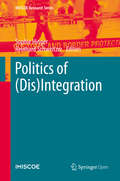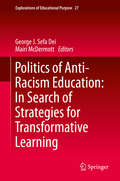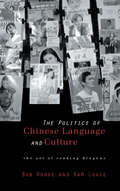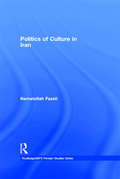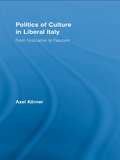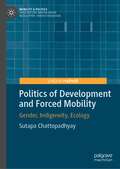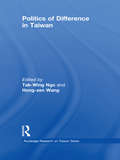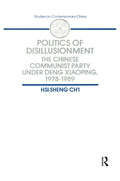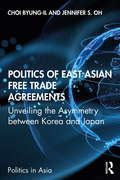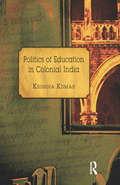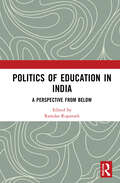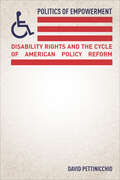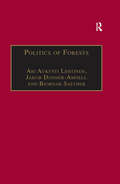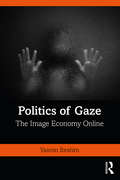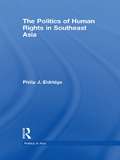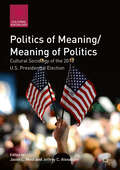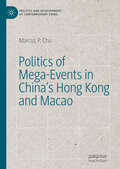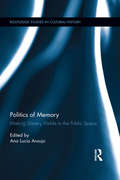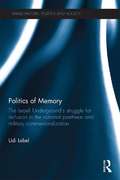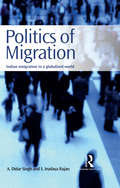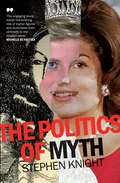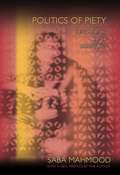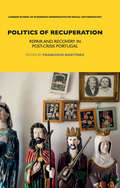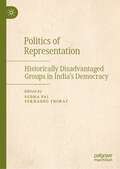- Table View
- List View
Politics of (IMISCOE Research Series)
by Sophie Hinger Reinhard SchweitzerThis open access book explores how contemporary integration policies and practices are not just about migrants and minority groups becoming part of society but often also reflect deliberate attempts to undermine their inclusion or participation. This affects individual lives as well as social cohesion. The book highlights the variety of ways in which integration and disintegration are related to, and often depend on each other. By analysing how (dis)integration works within a wide range of legal and institutional settings, this book contributes to the literature on integration by considering (dis)integration as a highly stratified process. Through featuring a fertile combination of comparative policy analyses and ethnographic research based on original material from six European and two non-European countries, this book will be a great resource for students, academics and policy makers in migration and integration studies.
Politics of Anti-Racism Education: In Search of Strategies for Transformative Learning
by George J. Sefa Dei Mairi McdermottThis collection of essays invites readers to think through critical questions concerning anti-racism education, such as: How does anti-racism education centre race as an analytic and simultaneously work with multiple sites of oppression, without reifying hierarchies of difference? How can anti-racism education be engaged to speak to historical questions of power and privilege, within conventional schooling practices? How do we recognize anti-racism education in its many iterations? In this book the authors explore the knowledge that constitutes anti-racism education and the ways in which knowledge constitutive of anti-racism education becomes embodied through particular pedagogues. The authors are anti-racism educators with experiences in diverse settings: the chapters cover various fields and socio-historic geographies, address contemporary educational issues, and are situated within personal-political, historical and philosophical conversations. Anti-racism education is a discursive stance and steeped in politics that shape and are shaped by everyday conversations, theories, and practices. The essays in this collection work through many of the possibilities and limitations of engaging in counter-hegemonic education for transformative learning. Readers will discover lived experiences, theory, practice and critical reflexivity.
Politics of Chinese Language and Culture: The Art of Reading Dragons (Culture and Communication in Asia)
by Kam Louie Bob HodgeAn innovative text which adopts the tools of cultural studies to provide a fresh approach to the study of Chinese language, culture and society. The book tackles areas such as grammar, language, gender, popular culture, film and the Chinese diaspora and employs the concepts of social semiotics to extend the ideas of language and reading. Covering a range of cultural texts, it will help to break down the boundaries around the ideas and identities of East and West and provide a more relevant analysis of the Chinese and China.
Politics of Culture in Iran (Routledge/BIPS Persian Studies Series)
by Nematollah FazeliThis first full-length study of the history of Iranian anthropology charts the formation and development of anthropology in Iran in the twentieth century. The text examines how and why anthropology and culture became part of wider socio-political discourses in Iran, and how they were appropriated, and rejected, by the pre- and post-revolutionary regimes. The author highlights the three main phases of Iranian anthropology, corresponding broadly to three periods in the social and political development of Iran: *the period of nationalism: lasting approximately from the constitutional revolution (1906-11) and the end of the Qajar dynasty until the end of Reza Shah’s reign (1941) *the period of Nativism: from the 1950s until the Islamic revolution (1979) *the post-revolutionary period. In addition, the book places Iranian anthropology in an international context by demonstrating how Western anthropological concepts, theories and methodologies affected epistemological and political discourses on Iranian anthropology.
Politics of Culture in Liberal Italy: From Unification to Fascism (Routledge Studies in Modern European History)
by Axel KörnerWith chapters on theatre and opera, architecture and urban planning, the medieval revival and the rediscovery of the Etruscan and Roman past, The Politics of Culture in Liberal Italy analyzes Italians' changing relationship to their new nation state and the monarchy, the conflicts between the peninsula's ancient elites and the rising middle class, and the emergence of new belief systems and of scientific responses to the experience of modernity.
Politics of Development and Forced Mobility: Gender, Indigeneity, Ecology (Mobility & Politics)
by Sutapa ChattopadhyayThis book broadly analyzes the displacement or forced relocation of Adivasis Indigenous peoples from the Narmada Valley in India due to the construction and execution of a large development project, the Sardar Sarovar project, which has substantially transformed Adivasi lives, roles, practices, and autonomy, and increased their dependence on capital, market, unsustainable farming practices and urban jobs. Globally, Indigenous communities live within a legacy of environmental dispossession due to economic development that dismantles their mental and physical well-being and a land-based way of life. Appropriation, dispossession, and accumulation is historical and contemporary. Stories of Adivasi people illustrate the horrors of systematic marginalization, in general, and Adivasi women’s reduced autonomy and economic sufficiency, in particular. Key to mention here is that decades of resistance, protests, counter-struggles, marches, direct action did not overturn bureaucratic regressions or structural and direct violence towards marginalized or resettled Adivasi people, but enabled networks of solidarity arguing their rights and access. The book does not attest to state or corporate power, but validates Adivasi agency and autonomy.
Politics of Difference in Taiwan (Routledge Research on Taiwan Series)
by Tak-Wing Ngo Hong-Zen WangTaiwan has been hailed as a successful case of democratization. Compared with many other nations, the transition from authoritarian rule occurred in a rather orderly fashion. Group consciousness emerged as a reaction to the decades-long suppression of cultural diversity under martial law as different social groups competed fiercely to exert their political subjectivity. This volume is the first study to examine the politics of difference in Taiwan. It aims to go beyond ethnic identity as the sole concern for group boundary, to acknowledge the interests of other marginalized groups, and to look behind reified group boundaries in order to discover group differences as mediated social relations based on overlapping boundaries rather than exclusive opposition. In exploring the politics of difference among minority groups and the problems arising from their struggle over political recognition, the book challenges the assumptions that groups are ontologically given, that groups are internally homogenous, and that the particularistic identities have no overlap. The chapters offer a broad coverage of major social groups including ethnic minorities, recent migrants, gay and lesbian groups, and marginalized workers. They offer perspective analyses of the ongoing struggles by minority groups to overcome subordination. .
Politics of Disillusionment: Chinese Communist Party Under Deng Xiaoping, 1978-89
by Hsi-Sheng ChiAn analysis of the Chinese Communist Party from the time of Deng Xiaoping's return to power in 1978 to his resignation from his last major party post in the wake of the 1989 Tiananmen crisis, this work traces the evolution of Deng's grand strategy to create unity and stability so that he could launch his ambitious programme to modernize China by the year 2000. The author examines the impact of Deng's goal on the events of spring 1989.
Politics of East Asian Free Trade Agreements: Unveiling the Asymmetry between Korea and Japan (Politics in Asia)
by Byung-il Choi Jennifer S. OhThis textbook explains the politics of free trade agreements in Japan and South Korea. Examining free trade agreements in Japan and South Korea since the late 1990s, Choi and Oh analyze the role of institutions, political leaders, sectoral interests, and civil society in placing the two countries on alternate paths of free trade agreements at different points in time. Systematically approaching the politics of free trade agreements from each perspective, they expose the domestic political underpinnings of free trade agreements in a global trade order that is increasingly fraught with conflict. A valuable textbook for students of international political economy and international trade in East Asia, particularly those focusing on Japan and South Korea. It’s also a useful resource for scholars and policymakers looking to better understand trade politics in East Asia.
Politics of Education in Colonial India (3D Photorealistic Rendering)
by Krishna KumarIn retracting from the popular view that India’s modern educational policy was shaped almost entirely by Macaulay, this incisive work reveals the complex ideological and institutional rubric of the colonial educational system. It examines its wide-ranging and lasting impact on curriculum, pedagogy, textbooks, teachers’ role and status, and indigenous forms of knowledge. Recounting the nationalist response to educational reforms, the book reinforces three major quests: justice as expressed in the demand for equal educational opportunities for the lower castes; self-identity as manifest in the urge to define India’s educational needs from within its own cultural repertoire; and the idea of progress based on industrialization. An exceptional contribution to educational theory, including a nuanced discussion of caste, gender and girls’ education, this book will be invaluable to teachers, scholars and students of education, modern Indian history and sociology of education, and policy makers.
Politics of Education in India: A Perspective from Below
by Ramdas RupavathThis book studies the state of tribal education in India. India has the single largest tribal population in the world, yet the tribal community remains one of the most economically impoverished and marginalized groups in the country. The volume • Examines the educational status of the tribal population and studies developmental issues such as unemployment, illiteracy, caste discrimination, and inequality faced by the community. • Studies the implementation and execution of welfare schemes, initiatives, and reforms in place to tackle issues faced by tribal students and identifies loopholes in the various centrally sponsored schemes. • Emphasizes the importance of the Right to Education Act and presents policy implications for the educational uplift of India’s very many millions of tribal people. A critical study of the Indian education system, this book will be indispensable to students and researchers of education, education policy, minority studies, indigenous studies, sociology of education, and South Asian studies.
Politics of Empowerment: Disability Rights and the Cycle of American Policy Reform
by David PettinicchioDespite the progress of decades-old disability rights policy, including the landmark Americans with Disabilities Act, threats continue to undermine the wellbeing of this population. The U.S. is, thus, a policy innovator and laggard in this regard. In Politics of Empowerment, David Pettinicchio offers a historically grounded analysis of the singular case of U.S. disability policy, countering long-held views of progress that privilege public demand as its primary driver. By the 1970s, a group of legislators and bureaucrats came to act as "political entrepreneurs." Motivated by personal and professional commitments, they were seen as experts leading a movement within the government. But as they increasingly faced obstacles to their legislative intentions, nascent disability advocacy and protest groups took the cause to the American people forming the basis of the contemporary disability rights movement. Drawing on extensive archival material, Pettinicchio redefines the relationship between grassroots advocacy and institutional politics, revealing a cycle of progress and backlash embedded in the American political system.
Politics of Forests: Northern Forest-industrial Regimes in the Age of Globalization (The Dynamics of Economic Space)
by Jakob Donner-AmnellBringing together case studies from Canada, the Nordic countries and Russia, this book is the first to provide a comparative examination of the current transformations in the forest industry regimes and the challenges they make for the communities dependent on this industry. Questioning how globalization has influenced forest regimes, the book focuses on individual forest companies and argues that they are the main motors of the industry's internationalization, often without taking due consideration of the complex interrelations between society, the environment and forest trade. During the current phase of globalization, the sphere of material production within the forest industry has increasingly been modified by more speculative signals from the market. Both the growing role of investor interests, as well as the broader societal demands for 'greening' the production chain, have forced managers to be more sensitive to the performance profile and image of their companies. In conclusion, the book highlights instances of processes working towards homogenization and diversity, and suggests that while Anglo-American management practice is increasingly important across the northern forest regions, it is also meeting with resistance due to historical and political conditions.
Politics of Gaze: The Image Economy Online
by Yasmin IbrahimGoing beyond the cursory reasons behind why we capture images on the move, Politics of Gaze explores our contemporary practices around visual imaging and brings original conceptualisations about why we constantly capture ourselves and our environments through digital technologies. Our technologically mediated ‘everyday visuality’ has moral and ethical implications for the ways in which we construct our worlds, understand world events, represent ourselves, commodify our environments and transact these with the wider world. Through these acts we constantly negotiate our sense of aesthetics, our notions of what is private and public, our depictions of the everyday and issues of security and conflict whilst constructing moral codes for a technologically-mediated society. This book argues that we have crafted a ‘Glasshouse’ society where the forms of gaze are open-ended, promising us empowerment while making us endlessly vulnerable. Politics of Gaze is a vital resource for New Media studies and related fields such as photography, technology studies, visual communications, journalism and sociology.
Politics of Human Rights in Southeast Asia (Politics in Asia)
by Philip J. EldridgeThe divide between the West and Southeast Asia seems to be nowhere more apparent than in debates about human rights. Within these diverse geographical, political and cultural climates, human rights seem to have become relative, and the quest for absolutes seems unattainable. In this new book Philip J Eldridge seeks to question this stalemate. He argues that the Association of Southeast Asian Nations' inclusion in United Nations' human rights treaties could be the common ground that bridges the gap between East and West. Eldridge uses topical case studies and primary research from Malaysia, Indonesia, East Timor and Australia, to compare the effectiveness of United Nations' human rights directives on local democracies. This study presents insightful research into a hotly debated topic. As such it will be a thought-provoking resource for students of human rights, politics and international relations.
Politics of Identity in Small Plural Societies
by Stacey-Ann WilsonIn small plural societies, cultural differences can be exaggerated, exploited and intensified during political contests. The survival of these societies as democracies - or even at all - hangs in the balance.
Politics of Meaning/Meaning of Politics: Cultural Sociology of the 2016 U.S. Presidential Election (Cultural Sociology)
by Jeffrey C. Alexander Jason L. MastThe 2016 U.S. presidential election revealed a nation deeply divided and in flux. This volume provides urgently needed insights into American politics and culture during this period of uncertainty. The contributions answer the election’s key mysteries, such as how contemporary Christian evangelicals identified in the unrepentant candidate Trump a hero to their cause, and how working class and economically struggling Americans saw in the rich and ostentatious candidate a champion of their plight. The chapters explain how irrationality is creeping into political participation, and demonstrate how media developments enabled a phenomenon like “fake news” to influence the election. At this polarized and contentious moment, this volume satisfies the urgent need for works that carefully analyze the forces and tensions tearing at the American social fabric. Simultaneously intellectual and accessible, this volume is designed to illuminate the 2016 U.S. presidential election and its aftermath for academics and students of politics alike.
Politics of Mega-Events in China's Hong Kong and Macao (Politics and Development of Contemporary China)
by Marcus P. ChuThis book explores the connection between politics and mega-events in post-handover Hong Kong and Macao. It also offers an in-depth account of the two cities’ keenness to integrate with China and engage in the international society and China’s eagerness to build image, boost influence and gain respect on the global arena. This work will facilitate academics, think tanks, diplomats and government officials to further understand the politics and international relations of China, Hong Kong and Macao.
Politics of Memory: Making Slavery Visible in the Public Space (Routledge Studies in Cultural History)
by Ana Lucia AraujoThe public memory of slavery and the Atlantic slave trade, which some years ago could be observed especially in North America, has slowly emerged into a transnational phenomenon now encompassing Europe, Africa, and Latin America, and even Asia – allowing the populations of African descent, organized groups, governments, non-governmental organizations and societies in these different regions to individually and collectively update and reconstruct the slave past. This edited volume examines the recent transnational emergence of the public memory of slavery, shedding light on the work of memory produced by groups of individuals who are descendants of slaves. The chapters in this book explore how the memory of the enslaved and slavers is shaped and displayed in the public space not only in the former slave societies but also in the regions that provided captives to the former American colonies and European metropoles. Through the analysis of exhibitions, museums, monuments, accounts, and public performances, the volume makes sense of the political stakes involved in the phenomenon of memorialization of slavery and the slave trade in the public sphere.
Politics of Memory: The Israeli Underground's Struggle for Inclusion in the National Pantheon and Military Commemoralization (Israeli History, Politics and Society)
by Udi LebelThis book illustrates how a dominant political party, the Mapai, under the leadership of P.M. David Ben-Gurion, chose to ‘hug,’ honor and commemorate ‘Her Fallen’ and ‘Her Bereaved Families,’ whilst simultaneously ignoring the fallen that were identified with the rival political party, Herut, led by Menachem Begin. Designing legislation and cultural policy designated for Teaching the public that those who sacrificed themselves in the Israeli War of Independence – were Hagana Members, one of three Israeli undergrounds movements, associated with Mapai specific ideological viewpoint. By that - the Israeli state created political legitimacy and dominance for Mapai – which was framed as the only political party which were involved with the struggle for national independence. "Her" fighters, battles and casualties became part of the collective memory and national ethos. This project was implemented by refusing to acknowledge "the Other" casualties of the Eztel and Lehi underground movements wich were ideological identified with Herut Party. The state excluded their bereaved families from the wider official military bereavement circle and forced them to experience "disenfranchised grief", With no access to official commemoration or to rehabilitative support. It was only after the Likud's (ex-Herut) victory in the 1977 elections that enabled P.M. Menachem Begin to correct this "exile from national identity" and to initiate the inclusion of "His" fighters and casualties to the military cemeteries, to the history books and to the state commemorations, as recognizing their families as part of the National Military Bereavement circles entitled to Honors and support. A thought provoking study about the dark side of the Israeli nation building era, Politics of Memory explores the politics of historiography, bereavement and military commemoration, and the confrontation over boundaries of national pantheon, examining the effects of these factors on Israeli national identity and politics. With introductions by Moshe Arens, former Israeli Minister of Defense and Minister for Foreign Affairs, and by Yehiel Kadishai, P.M. Menachem Begin’s chief of staff, this book will be of interest to students and scholars of Israeli history; military studies; memory and heritage studies; the study of loss and bereavement, and politics in general.
Politics of Migration: Indian Emigration in a Globalized World
by S. Irudaya Rajan A. Didar SinghThis book studies the politics surrounding Indian emigration from the 19th century to the present day. Bringing together data and case studies from across five continents, it moves beyond economic and social movers of migration, and explores the role of politics—both local and global—in shaping diaspora at a deeper level. The work will be invaluable to scholars and students of migration and diaspora studies, development studies, international politics, and sociology as well as policy-makers, and non-governmental organizations in the field.
Politics of Myth
by Stephen KnightIn The Politics of Myth, Stephen Knight studies nine figures still vividly alive, all of them appearing in twenty-first century film and television. Analysing how they relate to the major themes of Power, Resistance and Knowledge, he shows how fact and fiction mix to help us explore and understand the complexities of our world.Surprising mythic shifts occur across time. Robin Hood can be a tough anti-authoritarian, a genial aristocrat, a Saxon patriot; Queen Elizabeth I has been seen as a Protestant heroine, a love-lorn lady, even a grumpy manipulator. From Merlin's multiple manifestations and Sherlock Holmes's smoking habits to the ongoing arguments about Ned Kelly, this book explores the richness and the range of figures of myth.
Politics of Piety: The Islamic Revival and the Feminist Subject
by Saba MahmoodPolitics of Piety is a groundbreaking analysis of Islamist cultural politics through the ethnography of a thriving, grassroots women's piety movement in the mosques of Cairo, Egypt. Unlike those organized Islamist activities that seek to seize or transform the state, this is a moral reform movement whose orthodox practices are commonly viewed as inconsequential to Egypt's political landscape. Saba Mahmood's compelling exposition of these practices challenges this assumption by showing how the ethical and the political are indelibly linked within the context of such movements. Not only is this book a sensitive ethnography of a critical but largely ignored dimension of the Islamic revival, it is also an unflinching critique of the secular-liberal assumptions by which some people hold such movements to account. The book addresses three central questions: How do movements of moral reform help us rethink the normative liberal account of politics? How does the adherence of women to the patriarchal norms at the core of such movements parochialize key assumptions within feminist theory about freedom, agency, authority, and the human subject? How does a consideration of debates about embodied religious rituals among Islamists and their secular critics help us understand the conceptual relationship between bodily form and political imaginaries? Politics of Piety is essential reading for anyone interested in issues at the nexus of ethics and politics, embodiment and gender, and liberalism and postcolonialism. In a substantial new preface, Mahmood addresses the controversy sparked by the original publication of her book and the scholarly discussions that have ensued.
Politics of Recuperation: Repair and Recovery in Post-Crisis Portugal (LSE Monographs on Social Anthropology)
by Francisco MartínezThrough a range of ethnographic case studies focusing on the Portuguese recovery after the economic crisis, this book begins a conversation about the experience of recuperation and repair. Located in the cracks and gaps between the state and society, recuperation appears as a social and infrastructural answer linked to reciprocity, critical urbanity, generational interweaving, alternate ordering and reconnection of different bodies and histories. With chapters looking at public art in Lisbon and recuperative modes of action, this collection takes a thorough look at a society in crisis and shows how the people of the community create micro-politics of resistance. Ultimately, Politics of Recuperation reflects on the meaning of personal and collective resilience in Europe today, as well as on the limits and interstices of contemporary politics.
Politics of Representation: Historically Disadvantaged Groups in India’s Democracy
by Sudha Pai Sukhadeo ThoratThe book presents debates around the concept of representation and how these ideas apply to representation for selected disadvantaged groups in India. It discusses empirical concerns and examines political representation of these disadvantaged groups in post-independence India. The experience of political representation of SCs, STs: the method of election, role of political parties in providing representation, role played by these groups in parliamentary institutions, and the extent of their participation. A second, significant area the volume attempts to cover is representation of the Muslim minority in parliament and state assemblies and understanding the reasons for their under-representation since independence, and more particularly in recent years.
